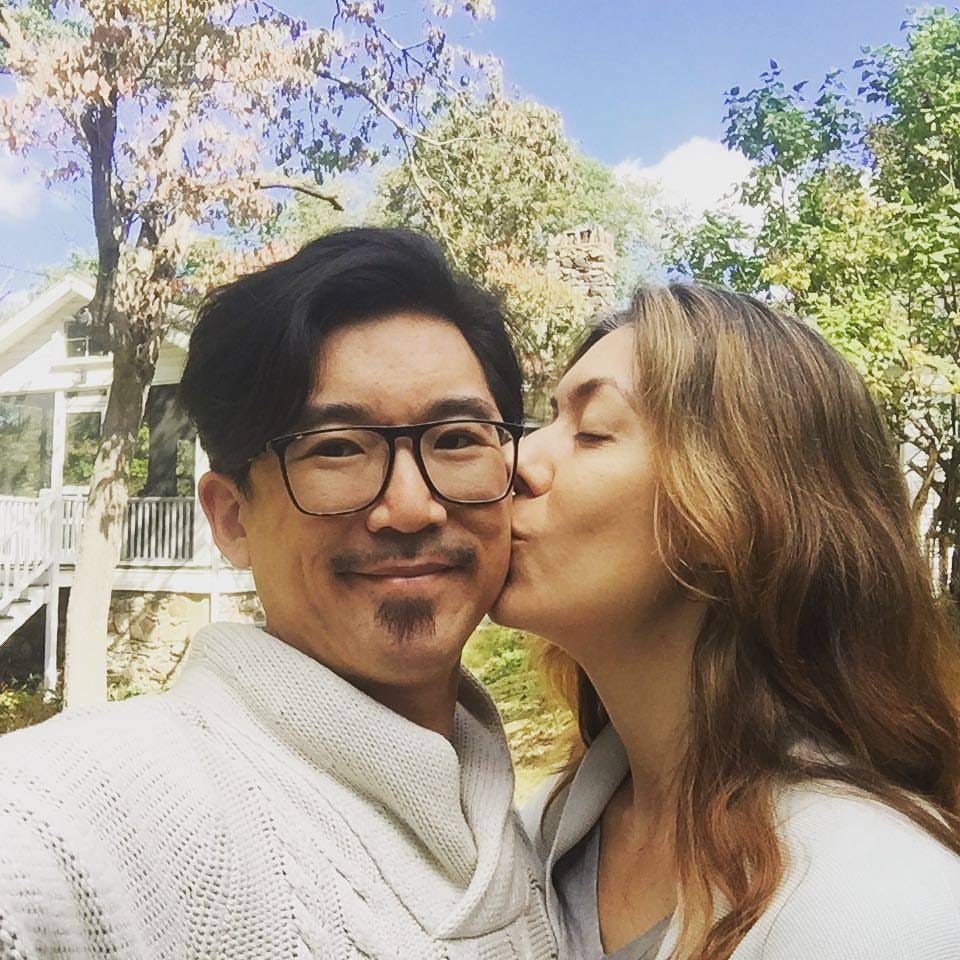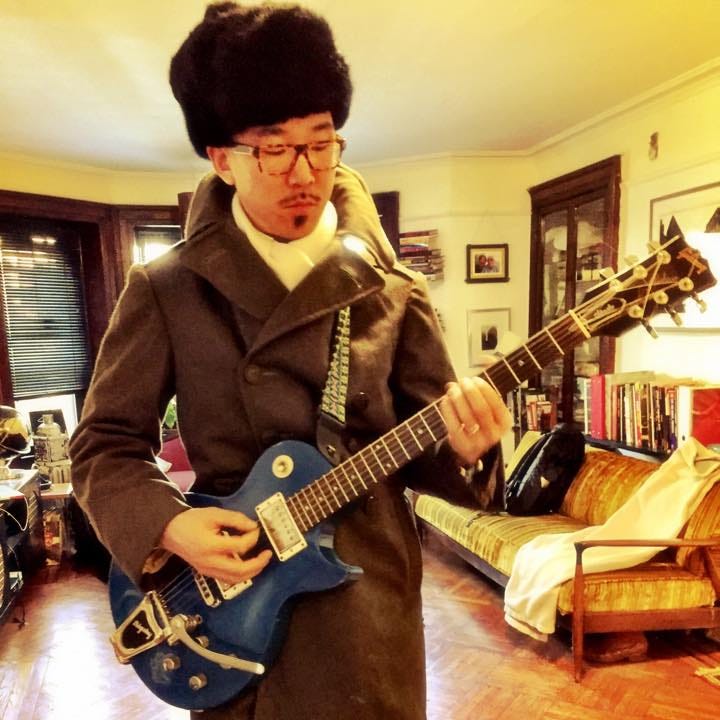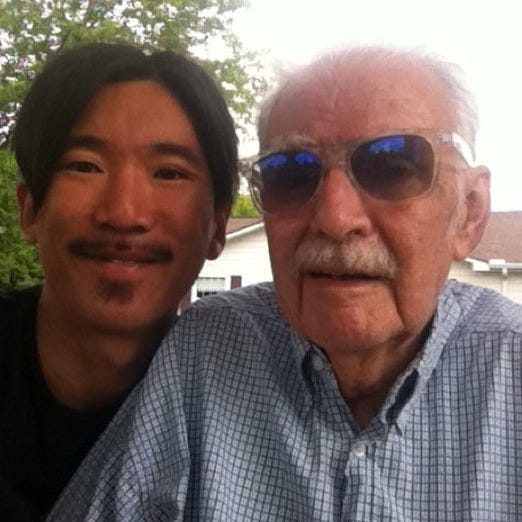Fatherhood can take many different forms. Sure, the one that’s most easy to define is that of biological father. But there are also friends and relatives who play a role in fatherhood. There are coaches, mentors, and teachers. And there are adoptive parents.
And through this newsletter, I aim to explore and highlight as many disparate experiences of fatherhood as I can. Which is what led me to interview my friend Euvin Weeber.
I know Euvin from my years in the record industry, when he was managing some of my favorite bands and generally just a good dude around town. We’ve stayed in touch over the years via social media and, shortly after I started the interview portion of this newsletter, he began sending some of his dad friends my way.
But why would Euvin give a shit about my fatherhood newsletter, I wondered? He didn’t have kids.
It turned out that he was reading these intently in preparation, as he and his wife were on the verge of adopting a child. Well, allow me to clarify: they were adopting a pre-teen.
And so I proposed an interview with Euvin, to learn more about his unique perspective into new fatherhood. Because I know what it’s like to be a new dad. But I have no idea what it’s like to be a dad to a pre-teen. And I can only imagine that doing both at the same time is full of its own set of challenges and rewards.
What was the impetus behind adopting? Why now?
Honestly, becoming parents was never a big part of the conversation between my wife and I for quite some time. When we became engaged, we would have brief “how do you feel about having a baby” conversations and we both respectively would arrive at the, “that would be cool but I’m not in a hurry” conclusion. I was secretly intimidated about the idea of becoming a father, but I felt pretty secure that I at least had the right partner to do it with. There was also an assumption by both of us, that pregnancy would just happen. After a few years of it not happening, we then started having some very serious and honest conversations about if becoming parents was something we really wanted to do, and what would be the next steps to making it happen. We started like many other middle-aged New York City couples with a fertility clinic, where we were given the sobering news that a “geriatric” pregnancy would be very difficult to achieve both physically and financially. At the same time we had also talked about adoption a few times through the years, and specifically about adopting from the foster care system as well but weren’t really exploring it at that time. Purely for fact-finding reasons, we decided to attend a Foster Parent orientation up in Orange County, New York where we had purchased a home. It was our first peek into to a very vast (and tragic) sub-culture of our society. We still weren’t sure at that point if this would be the right path for us, but from this meeting we learned that in order to adopt from the foster care system, we would need to be certified by the state of New York. And in order to do so we would need to take a training course which they call “MAPP” training. We figured we would go through the training and learn more about how it works and try to learn more about the kids who are in the system. MAPP Training takes a few months and through it we learned about the effects of trauma on children, which ALL kids in the foster care system have gone through (some more than others). We also learned about some of the basic steps about advocation, and the procedural steps that would be necessary to make it happen. As new doors kept opening up in the path before us, we kept on opening them up. The whole process took nearly two years, so the decision to adopt was very gradual.
Do you feel like you've missed out on anything by adopting a teenager? Was there ever a discussion to adopt a baby? Do you feel as though you've missed out on anything but adopting an older kid (beyond Earth-shattering tantrums and cleaning human shit out of your fingernails)?
Our daughter arrived with us from Texas in Feb of 2023 and then turned twelve in June of this year. Her age is probably the first question that we get asked when we speak with folks about our adoption. First off, infants and toddler are very difficult to come by through the foster care system. When we were still in the initial stages of our journey we had agreed on wanting to adopt a boy or a girl between the ages of 3-10 years old. Ideally we were hoping for a kid around the age of 5-6ish. Young enough to do “kid” stuff and bond with, and hopefully build a high enough level of trust before the stormy teen years hit. What changed was when we began doing the “Matching” stage of the adoption process. The matching stage is which is when prospective parents try to find the right kid for them, while also trying to prove (or sell) themselves to be worthwhile candidates for the kids who are available for adoption. The foster system is not a national system, so it is fragmented state-by-state. Each state has their own idiosyncracies (aka resources). There is a database where each state can upload their respective available kids, which makes it a little bit easier. The closest analog I can describe this process with is trying to find an apartment in New York, which anyone who has ever lived in New York can relate to. When you start looking for an apartment in New York you have a huge wish list of characteristics that your dream apartment should have. There’s so many apartment out there, how could it be so hard to find that “perfect” one? What invariably starts to happen after your first week of looking through Trulia or Craigslist you realize 1. Wow these apartments leave the market really fast! 2. Finding an apartment becomes a full-time all-consuming job. 3. What you want, and what you can actually afford are two vastly different things, 4. When you find that “dream” apartment you have to “sell” yourself because ten other people have also applied for that same place. And ultimately 5. In order to find a place to live you have to learn to compromise to the realities of the situation.
The matching process is like finding an apartment x10. I think we all know that there are kids out there who needs home, but nothing can really prepare you when you start to see how MANY kids there are, and how every day there are more and more kids being put into a very overwhelmed (and mostly underfunded) system. As a base line these kids have all gone through the trauma of losing their parents. Then you add emotional and developmental issues, severe medical needs, sexual abuse, physical and emotional violence, incest, drug use, etc etc etc. We looked at 195 different kids’ individual case files who were classified as “mild to moderate needs” and the stories we came across would chill you to your bone. Once again my wife and I had to have some very difficult and honest conversations about what kind of kid could we handle. What sort of needs did we think we could adequately meet for a kid? But also what types of behaviors or traits could be real triggers to each of us emotionally? When faced with all of these variables, things like the gender of the kid or even the age start to take less and less importance in the decision-making process. The girl that we were matched with was 10 years old when we were first matched with her, she was 11 by the time we met her online, and then turned 12 within a few months of arriving here with us. I won’t lie, we now fully appreciate how difficult a situation it is to parachute right into one of the most challenging times of a kid’s growth cycle. It’s been not only difficult for us, but for her, too. She came to us right in the middle of a school year with a very different curriculum. She’s in a stage where she’s trying to learn social skills with peers but she’s had to start all over (again, for the FOURTH time in her life). Despite all of the anxiety and angst this shotgun beginning has brought into our lives, we still believe that she is the right kid for us. It’s been pretty tough beginning but with each passing week the road gets smoother.
What have been some of the challenges? What are some of the highlights?
Trust is by far the biggest challenge. She doesn’t know us and we don’t know her. Most people don’t realize that a human’s sense of trust begins to get imprinted in us within the first few weeks of life and continues through the toddler stage. With her history of abandonment and neglect, her instinctual idea of trust is extremely challenged. It’s our job to try to create a new rock of stability for her. But it’s not an easy task and it is not a fast process. Our daughter has developed survival tactics that were successful in getting her what she needed in the short term but were often times detrimental in the long term. She has had a lot of broken promises in her past which understandably made her a mistrustful on a level most of us could not comprehend. There are a lot of locked doors in our path to get through to her. With time we are seeing the barbed wire fence coming down and some of the doors are opening but it is a slow and nuanced process. On the highlight side though, as she begins to trust us more, she is starting to allow us to open new doors for her to a lot of new experiences that she had never had before and that can be quite a special thing to be able to give. It is also fulfilling when you can actually “feel” her trust begin to grow stronger and stronger each passing day. I’ve been trying to try to teach her how to skateboard this week and her admitting her own fears about it and me being able to console and support her as she moves through those fears has been a very powerful experience for both of us. Next up will be conquering bicycle riding!
Another challenge is handling expectations. I think that this is a common thing for all parents, but it is especially true for parenting adopted kids. One thing we are continually learning is how to manage our own internal expectations. Before our daughter arrived we had all kinds of ideas of what it would be like, the things we would be doing together, the places we would be going together etc etc. Needless to say we had to change those expectations dramatically once she arrived, which was a hard thing to do. It’s amazing how much strength it requires to change our own minds when an idea or expectation is planted in there. We cannot compare our kid to other kids in her age group. There are several things that she can’t understand why she can’t do, while other kids her age can do. The difference is that the other kids parents have known them for twelve years, while we have only had our kid for six months. We know that she has the capacity to be a fully realized adult who is caring and a productive member in our society yet we also understand that despite our adopting her, because of the trauma in her history, the cards are stacked against her. It will take more effort on her part to do as well as the “other” kids. She is an incredibly special and resilient kid though, and all we can do is to be strong foundation she needs in order do the work.
It's still early in your path, but how do you view yourself as a father? What kind of dad do you think you are?
The only way I can answer this question is by saying that I am in awe of my wife who takes on most of the heavy lifting (Ed. same)! I know that a core component of my personality is empathy and thoughtfulness. It was my key traits that helped me even in my years in the music biz and as an artist manager. I could relate to what the artist needs were and then make a situation in which those needs would be met. On the negative side though, this personality trait was also getting me in trouble in the beginning of our parenting journey, where I was “over-providing” and being over-accommodating for our kiddo. Others around me though keep telling me that this personality trait can be one of my super-powers with being a dad so I’m standing by it, but at the same time I am trying to get better at providing more structure and discipline while also at the same time providing a setting where our daughter can start to accomplish things for herself.
What kind of father was your father? What about his parenting style have you adopted? What have you tried to avoid?
Much like my daughter, I too was adopted. I was adopted by my mother’s second husband, who was my primary caregiver. My dad was an immigrant from Germany so we were quite the odd couple in suburban Ohio where I was raised. My dad was an international sales man, so he had to travel quite a bit. I guess in this modern era he would classified as an absentee father with an authoritarian style of parenting. The absentee father had some negatives and some benefits. I was given a lot more freedoms that a lot of other kids around me weren’t afforded, but not having my caregiver around led to a lot of challenges for me later on as I tried to have relationships with other people as an adult. I had low self esteem due to my shaky foundation and especially growing up as a minority in the largely homogenous Ohio culture I grew up in. I want to be able to give our kiddo a sense of freedom to find herself and also make her own mistakes, but unlike my father I plan on being around to help guide (hopefully) away from many of the darker avenues that I ended up traveling. My father kept a lot of secrets, and that is one thing I’m avoiding. I am very open with my kid. She is right at the doorstep of some very challenging situations (sex, drugs and alcohol for example). She hasn’t been exposed yet, and still thinks those things are “gross” but they are being discussed. I have been open about my past, mistakes that I or those very close to me have had. About losses from drugs and alcohol I’ve had. I speak frankly and repeatedly about these things because I know that because of her past and her struggles it will be extremely difficult for her to navigate her way through these things. My hope is that with the repetition the message of it will find seed in her mind. If anything I hope that she will at least feel secure enough in our relationship that when she is exposed to these things she can feel open to talking to me about them, but only time will tell.







What a heartwarming interview. Kudoes to Euvin and his wife.